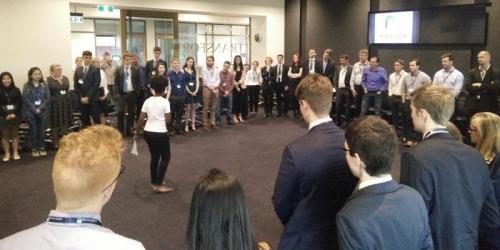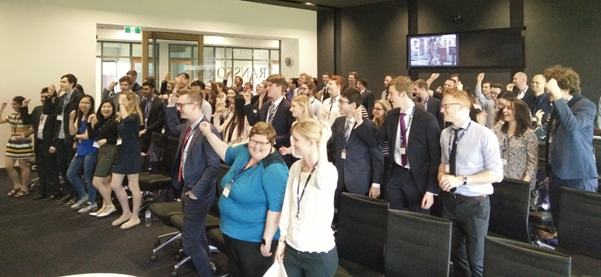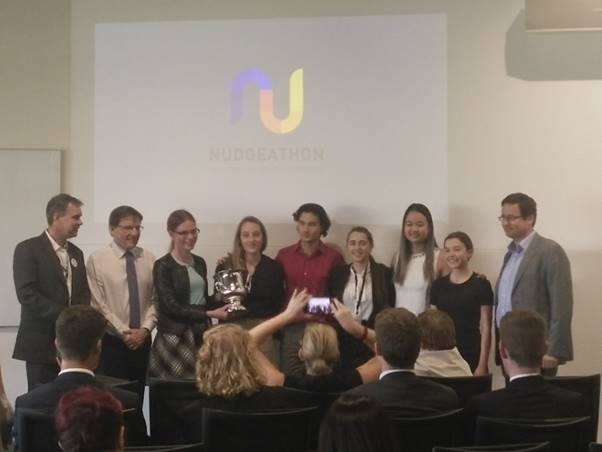
How do you change the way people feel about giving and encourage volunteering?
This September, university students from around Australia and APS graduates from the Department of Social Services gathered together in Brisbane over three days to brainstorm nudge solutions to increase volunteering at Australia’s first Nudgeathon. A nudgeathon is a ‘nudging marathon’ where students work on a real problem to a social issue and develop implementable solutions, inspired by behavioural insights. Nudgeathon was first created by the University of Warwick in the UK.
This year’s directive: use behavioural insights to create an “out of the box” solution to encourage more volunteering by young people aged between 18-30 years. Solutions had to be innovative and creative as well as be feasible and realistic.
The event program included team building exercises (e.g., coming up with unique team names – ‘Chicken Nudgets come in packs of 6!’), sessions on behaviour change and the challenge of volunteering, and presentations from volunteer representatives about their experiences.
At BETA we’re proud to be the major sponsor of this inaugural event in Australia. The Nudgeathon was also supported by the Local Government Association of Queensland, and was hosted by Queensland University of Technology and the Warwick Business School UK. Representatives from BETA and the Department of Social Services gave opening talks on how behavioural insights can be applied to public policy and why the Australian Public Service is interested in boosting rates of volunteering among young Australians.

So, why volunteering?
Young people who engage in social action, such as volunteering, develop critical life skills for employment and adulthood, including higher levels of grit, empathy and cooperation. Young volunteers also help others at the same time as they build these skills [1].
For volunteers, it’s a chance to gain valuable work experience, have opportunities to take on leadership roles that are otherwise hard to get, and form social connections.
The Government is also working with leaders from the community and businesses to promote philanthropic giving, volunteering and investment in Australia, as part of the Prime Minister’s Community Business Partnership. And get this, in 2014, voluntary work contributed 743 million hours to the community (ABS, 2014) [2].
The science behind volunteering
The behavioural insights sessions highlighted key biases that might help or hinder higher rates of volunteering by young Australians. For example:
- Altruism – compassion for others – can increase volunteering when young people want to do good without expecting anything in return.
- Social norms – doing what others around you do – can either increase or decrease volunteering as young people are more likely to volunteer if people around them volunteer.
- Present bias – our tendency to value the present over the future – can decrease volunteering as young people may disregard the future benefits of volunteering.
Volunteering representatives also mentioned that for volunteers, feeling valued and appreciated is important.
The moment we’ve been waiting for
The 11 participating teams had a day to get their ideas together to form a 12-minute presentation to the group. Ideas were evaluated by a panel comprising of behavioural insights experts Bob Slonim and Daniel Read (from BETA & the Warwick Business School), and government policy representatives (from the Department of Social Services, and the Local Government Association of Queensland). The panel looked at three dimensions: potential social impact, feasibility of implementation, and the use of behavioural science.
The ideas presented were great! They ranged from behaviourally informed apps to make volunteering easier, to revamped websites matching volunteer skills to agency needs, to volunteering programs in high schools. The winning idea was from a team from the University of Sydney; which incorporated updates to an existing volunteering site, a lottery prize system, and big attractive prizes.
Worth it?
The general consensus is overwhelmingly positive: “this was a really good opportunity for us to sit down and think through innovative ideas for policy”. One student commented on the big task and short time frame: "you don’t know what you can achieve until you’re thrown into it".
"I would definitely want to come back!'
BETA thanks all participants and hosts for an energy-filled, creative, inaugural Australian #Nudgeathon. To borrow from one of the teams, we’ll leave you with this ‘nudget’ of wisdom: “Do your little bit of good where you are; it's those little bits of good put together that overwhelm the world” – Desmond Tutu.
[1] - Behavioural Insights Team UK: Evaluating Youth Social Action – Final Report
[2] - Australian Bureau of Statistics: 4159.0 - General Social Survey: Summary Results, Australia, 2014

